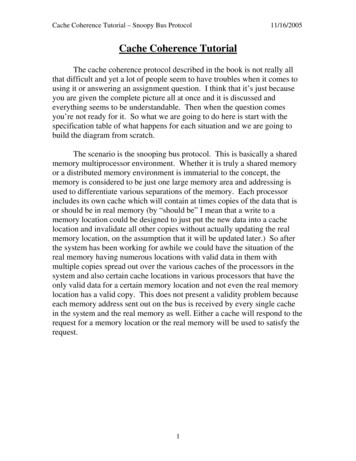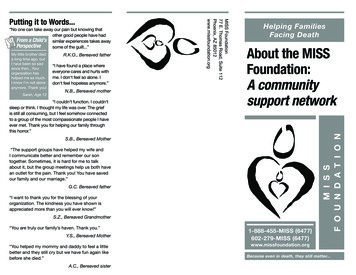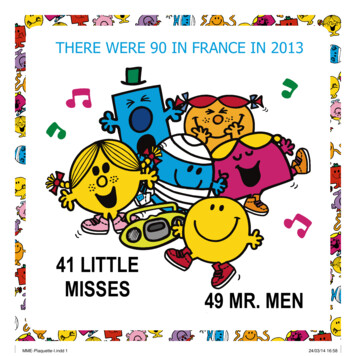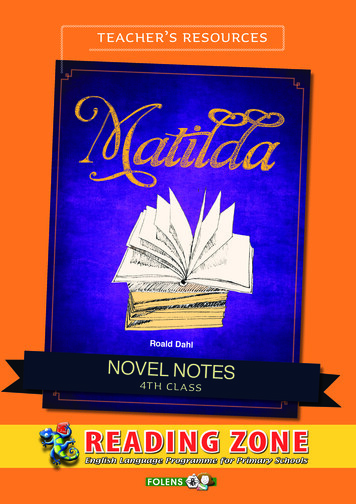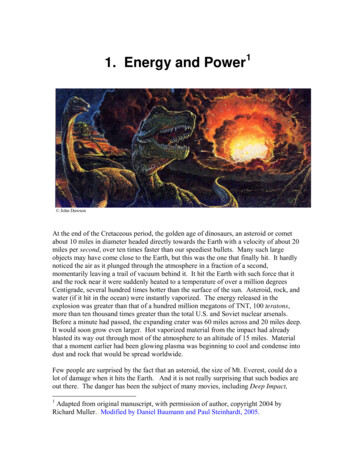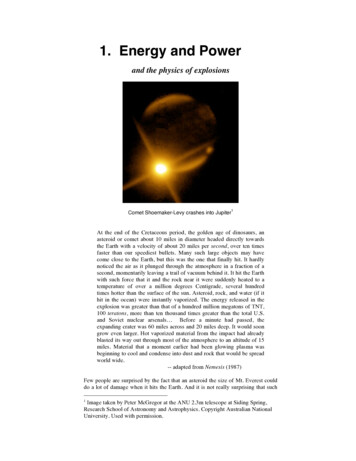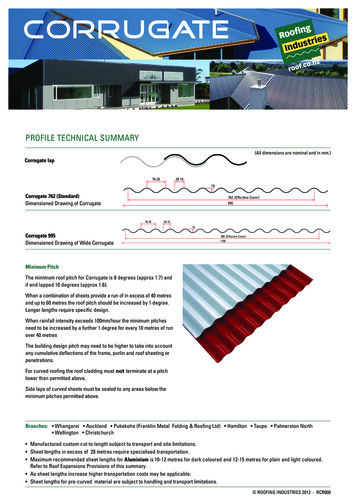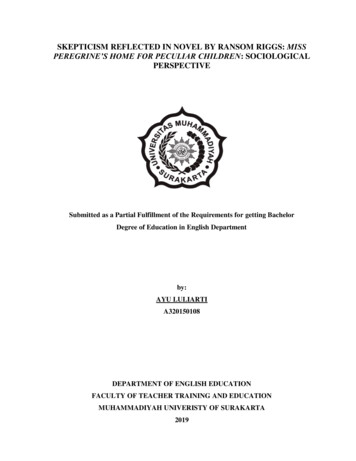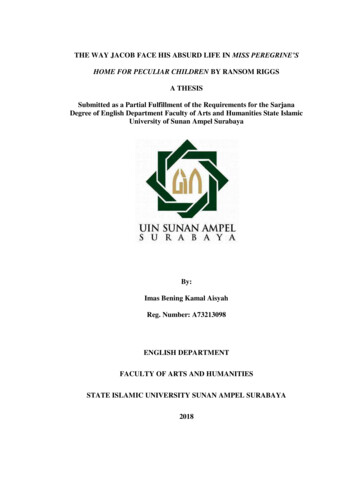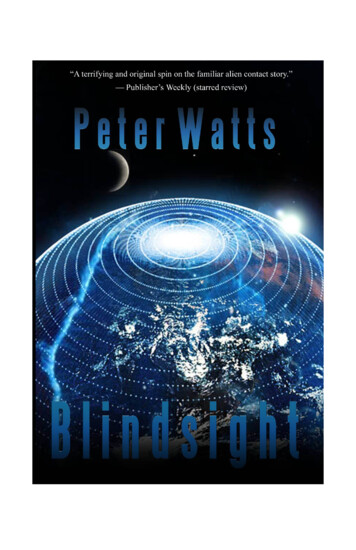
Transcription
BlindsightPeter ntsNotes and ReferencesCreative Commons Licensing Information611115300307309331
"This is what fascinates me most in existence: the peculiar necessity ofimagining what is, in fact, real."—Philip Gourevitch"You will die like a dog for no good reason."—Ernest Hemingway
Peter Watts6BlindsightPrologue"Try to touch the past. Try to deal with the past. It's not real. It's just adream."—Ted BundyIt didn't start out here. Not with the scramblers or Rorschach,not with Big Ben or Theseus or the vampires. Most people wouldsay it started with the Fireflies, but they'd be wrong. It ended withall those things.For me, it began with Robert Paglino.At the age of eight, he was my best and only friend. We werefellow outcasts, bound by complementary misfortune. Mine wasdevelopmental. His was genetic: an uncontrolled genotype thatleft him predisposed to nearsightedness, acne, and (as it laterturned out) a susceptibility to narcotics.His parents had neverhad him optimized. Those few TwenCen relics who still believedin God also held that one shouldn't try to improve upon Hishandiwork. So although both of us could have been repaired, onlyone of us had been.I arrived at the playground to find Pag the center of attention forsome half-dozen kids, those lucky few in front punching him in thehead, the others making do with taunts of mongrel and polly whilewaiting their turn. I watched him raise his arms, almost hesitantly,to ward off the worst of the blows. I could see into his head betterthan I could see into my own; he was scared that his attackersmight think those hands were coming up to hit back, that they'dread it as an act of defiance and hurt him even more. Even then, atthe tender age of eight and with half my mind gone, I wasbecoming a superlative observer.But I didn't know what to do.I hadn't seen much of Pag lately. I was pretty sure he'd beenavoiding me. Still, when your best friend's in trouble you help out,right? Even if the odds are impossible—and how many eight-year-
Peter Watts7Blindsightolds would go up against six bigger kids for a sandbox buddy?—atleast you call for backup. Flag a sentry. Something.I just stood there. I didn't even especially want to help him.That didn't make sense. Even if he hadn't been my best friend, Ishould at least have empathized. I'd suffered less than Pag in theway of overt violence; my seizures tended to keep the other kids ata distance, scared them even as they incapacitated me. Still. I wasno stranger to the taunts and insults, or the foot that appears fromnowhere to trip you up en route from A to B. I knew how that felt.Or I had, once.But that part of me had been cut out along with the bad wiring. Iwas still working up the algorithms to get it back, still learning byobservation. Pack animals always tear apart the weaklings in theirmidst. Every child knows that much instinctively. Maybe I shouldjust let that process unfold, maybe I shouldn't try to mess withnature. Then again, Pag's parents hadn't messed with nature, andlook what it got them: a son curled up in the dirt while a bunch ofengineered superboys kicked in his ribs.In the end, propaganda worked where empathy failed. Back thenI didn't so much think as observe, didn't deduce so much asremember—and what I remembered was a thousand inspirationalstories lauding anyone who ever stuck up for the underdog.So I picked up a rock the size of my fist and hit two of Pag'sassailants across the backs of their heads before anyone even knewI was in the game.A third, turning to face the new threat, took a blow to the facethat audibly crunched the bones of his cheek. I rememberwondering why I didn't take any satisfaction from that sound, whyit meant nothing beyond the fact I had one less opponent to worryabout.The rest of them ran at the sight of blood. One of the braverpromised me I was dead, shouted "Fucking zombie!" over hisshoulder as he disappeared around the corner.Three decades it took, to see the irony in that remark.Two of the enemy twitched at my feet. I kicked one in the headuntil it stopped moving, turned to the other. Something grabbedmy arm and I swung without thinking, without looking until Pag
Peter Watts8Blindsightyelped and ducked out of reach."Oh," I said. "Sorry."One thing lay motionless. The other moaned and held its headand curled up in a ball."Oh shit," Pag panted. Blood coursed unheeded from his noseand splattered down his shirt. His cheek was turning blue andyellow. "Oh shit oh shit oh shit."I thought of something to say. "You all right?""Oh shit, you—I mean, you never." He wiped his mouth.Blood smeared the back of his hand. "Oh man are we in trouble.""They started it.""Yeah, but you—I mean, look at them!"The moaning thing was crawling away on all fours. I wonderedhow long it would be before it found reinforcements. I wonderedif I should kill it before then."You'da never done that before," Pag said.Before the operation, he meant.I actually did feel something then—faint, distant, butunmistakable. I felt angry. "They started—"Pag backed away, eyes wide. "What are you doing? Put thatdown!"I'd raised my fists. I didn't remember doing that. I unclenchedthem. It took a while. I had to look at my hands very hard for along, long time.The rock dropped to the ground, blood-slick and glistening."I was trying to help." I didn't understand why he couldn't seethat."You're, you're not the same," Pag said from a safe distance."You're not even Siri any more.""I am too. Don't be a fuckwad.""They cut out your brain!""Only half. For the ep—""I know for the epilepsy! You think I don't know? But you werein that half—or, like, part of you was." He struggled with thewords, with the concept behind them. "And now you're different.It's like, your mom and dad murdered you—""My mom and dad," I said, suddenly quiet, "saved my life. I
Peter Watts9Blindsightwould have died.""I think you did die," said my best and only friend. "I think Siridied, they scooped him out and threw him away and you're somewhole other kid that just, just grew back out of what was left.You're not the same. Ever since. You're not the same."I still don't know if Pag really knew what he was saying. Maybehis mother had just pulled the plug on whatever game he'd beenwired into for the previous eighteen hours, forced him outside forsome fresh air. Maybe, after fighting pod people in gamespace, hecouldn't help but see them everywhere. Maybe.But you could make a case for what he said. I do rememberHelen telling me (and telling me) how difficult it was to adjust.Like you had a whole new personality, she said, and why not?There's a reason they call it radical hemispherectomy: half thebrain thrown out with yesterday's krill, the remaining half pressganged into double duty. Think of all the rewiring that one lonelyhemisphere must have struggled with as it tried to take up theslack. It turned out okay, obviously. The brain's a very flexiblepiece of meat; it took some doing, but it adapted. I adapted. Still.Think of all that must have been squeezed out, deformed, reshapedby the time the renovations were through. You could argue thatI'm a different person than the one who used to occupy this body.The grownups showed up eventually, of course. Medicine wasbestowed, ambulances called. Parents were outraged, diplomaticvolleys exchanged, but it's tough to drum up neighborhood outrageon behalf of your injured baby when playground surveillance fromthree angles shows the little darling—and five of his buddies—kicking in the ribs of a disabled boy. My mother, for her part,recycled the usual complaints about problem children and absenteefathers—Dad was off again in some other hemisphere—but thedust settled pretty quickly. Pag and I even stayed friends, after ashort hiatus that reminded us both of the limited social prospectsopen to schoolyard rejects who don't stick together.So I survived that and a million other childhood experiences. Igrew up and I got along. I learned to fit in. I observed, recorded,derived the algorithms and mimicked appropriate behaviors. Notmuch of it was—heartfelt, I guess the word is. I had friends and
Peter Watts10Blindsightenemies, like everyone else. I chose them by running throughchecklists of behaviors and circumstances compiled from years ofobservation.I may have grown up distant but I grew up objective, and I haveRobert Paglino to thank for that. His seminal observation seteverything in motion. It led me into Synthesis, fated me to ourdisastrous encounter with the Scramblers, spared me the worse fatebefalling Earth. Or the better one, I suppose, depending on yourpoint of view. Point of view matters: I see that now, blind, talkingto myself, trapped in a coffin falling past the edge of the solarsystem. I see it for the first time since some beaten bloody friendon a childhood battlefield convinced me to throw my own point ofview away.He may have been wrong. I may have been. But that, thatdistance—that chronic sense of being an alien among your ownkind—it's not entirely a bad thing.It came in especially handy when the real aliens came calling.
Peter Watts11BlindsightTheseus
Peter Watts12Blindsight"Blood makes noise." —Susanne VegaImagine you are Siri Keeton:You wake in an agony of resurrection, gasping after a recordshattering bout of sleep apnea spanning one hundred forty days.You can feel your blood, syrupy with dobutamine andleuenkephalin, forcing its way through arteries shriveled by monthson standby. The body inflates in painful increments: blood vesselsdilate; flesh peels apart from flesh; ribs crack in your ears withsudden unaccustomed flexion. Your joints have seized up throughdisuse. You're a stick-man, frozen in some perverse rigor vitae.You'd scream if you had the breath.Vampires did this all the time, you remember. It was normal forthem, it was their own unique take on resource conservation. Theycould have taught your kind a few things about restraint, if thatabsurd aversion to right-angles hadn't done them in at the dawn ofcivilization. Maybe they still can. They're back now, after all—raised from the grave with the voodoo of paleogenetics, stitchedtogether from junk genes and fossil marrow steeped in the blood ofsociopaths and high-functioning autistics. One of them commandsthis very mission. A handful of his genes live on in your own bodyso it too can rise from the dead, here at the edge of interstellarspace. Nobody gets past Jupiter without becoming part vampire.The pain begins, just slightly, to recede. You fire up your inlaysand access your own vitals: it'll be long minutes before your bodyresponds fully to motor commands, hours before it stops hurting.The pain's an unavoidable side effect. That's just what happenswhen you splice vampire subroutines into Human code. You askedabout painkillers once, but nerve blocks of any kind compromisemetabolic reactivation. Suck it up, soldier.You wonder if this was how it felt for Chelsea, before the end.But that evokes a whole other kind of pain, so you block it out andconcentrate on the life pushing its way back into your extremities.Suffering in silence, you check the logs for fresh telemetry.You think: That can't be right.Because if it is, you're in the wrong part of the universe. You're
Peter Watts13Blindsightnot in the Kuiper Belt where you belong: you're high above theecliptic and deep into the Oort, the realm of long-period cometsthat only grace the sun every million years or so. You've goneinterstellar, which means (you bring up the system clock) you'vebeen undead for eighteen hundred days.You've overslept by almost five years.The lid of your coffin slides away. Your own cadaverous bodyreflects from the mirrored bulkhead opposite, a desiccated lungfishwaiting for the rains. Bladders of isotonic saline cling to its limbslike engorged antiparasites, like the opposite of leeches. Youremember the needles going in just before you shut down, wayback when your veins were more than dry twisted filaments of beefjerky.Szpindel's reflection stares back from his own pod to yourimmediate right. His face is as bloodless and skeletal as yours.His wide sunken eyes jiggle in their sockets as he reacquires hisown links, sensory interfaces so massive that your own off-theshelf inlays amount to shadow-puppetry in comparison.You hear coughing and the rustling of limbs just past line-ofsight, catch glimpses of reflected motion where the others stir atthe edge of vision."Wha—" Your voice is barely more than a hoarse whisper. " happ ?"Szpindel works his jaw. Bone cracks audibly." Sssuckered," he hisses.You haven't even met the aliens yet, and already they're runningrings around you.*So we dragged ourselves back from the dead: five part-timecadavers, naked, emaciated, barely able to move even in zero gee.We emerged from our coffins like premature moths ripped fromtheir cocoons, still half-grub. We were alone and off course andutterly helpless, and it took a conscious effort to remember: theywould never have risked our lives if we hadn't been essential."Morning, commissar." Isaac Szpindel reached one trembling,
Peter Watts14Blindsightinsensate hand for the feedback gloves at the base of his pod. Justpast him, Susan James was curled into a loose fetal ball,murmuring to herselves. Only Amanda Bates, already dressed andcycling through a sequence of bone-cracking isometrics, possessedanything approaching mobility. Every now and then she triedbouncing a rubber ball off the bulkhead; but not even she was up tocatching it on the rebound yet.The journey had melted us down to a common archetype. James'round cheeks and hips, Szpindel's high forehead and lumpy, lankychassis—even the enhanced carboplatinum brick shit-house thatBates used for a body— all had shriveled to the same desiccatedcollection of sticks and bones. Even our hair seemed to havebecome strangely discolored during the voyage, although I knewthat was impossible. More likely it was just filtering the pallor ofthe skin beneath. Still. The pre-dead James had been dirty blond,Szpindel's hair had been almost dark enough to call black— but thestuff floating from their scalps looked the same dull kelpy brown tome now. Bates kept her head shaved, but even her eyebrowsweren't as rusty as I remembered them.We'd revert to our old selves soon enough. Just add water. Fornow, though, the old slur was freshly relevant: the Undead reallydid all look the same, if you didn't know how to look.If you did, of course—if you forgot appearance and watched formotion, ignored meat and studied topology—you'd never mistakeone for another. Every facial tic was a data point, everyconversational pause spoke volumes more than the words to eitherside. I could see James' personae shatter and coalesce in the flutterof an eyelash. Szpindel's unspoken distrust of Amanda Batesshouted from the corner of his smile. Every twitch of thephenotype cried aloud to anyone who knew the language."Where's—" James croaked, coughed, waved one spindly arm atSarasti's empty coffin gaping at the end of the row.Szpindel's lips cracked in a small rictus. "Gone back to Fab, eh?Getting the ship to build some dirt to lie on.""Probably communing with the Captain." Bates breathed louderthan she spoke, a dry rustle from pipes still getting reacquaintedwith the idea of respiration.
Peter Watts15BlindsightJames again: "Could do that up here.""Could take a dump up here, too," Szpindel rasped. "Somethings you do by yourself, eh?"And some things you kept to yourself. Not many baselines feltcomfortable locking stares with a vampire—Sarasti, evercourteous, tended to avoid eye contact for exactly that reason—butthere were other surfaces to his topology, just as mammalian andjust as readable. If he had withdrawn from public view, maybe Iwas the reason. Maybe he was keeping secrets.After all, Theseus damn well was.*She'd taken us a good fifteen AUs towards our destination beforesomething scared her off course. Then she'd skidded north like astartled cat and started climbing: a wild high three-gee burn off theecliptic, thirteen hundred tonnes of momentum bucking againstNewton's First. She'd emptied her Penn tanks, bled dry hersubstrate mass, squandered a hundred forty days' of fuel in hours.Then a long cold coast through the abyss, years of stingyaccounting, the thrust of every antiproton weighed against the dragof sieving it from the void. Teleportation isn't magic: the Icarusstream couldn't send us the actual antimatter it made, only thequantum specs. Theseus had to filterfeed the raw material fromspace, one ion at a time. For long dark years she'd made do onpure inertia, hoarding every swallowed atom. Then a flip; ionizinglasers strafing the space ahead; a ramscoop thrown wide in a hardbrake. The weight of a trillion trillion protons slowed her downand refilled her gut and flattened us all over again. Theseus hadburned relentless until almost the moment of our resurrection.It was easy enough to retrace those steps; our course was there inConSensus for anyone to see. Exactly why the ship had blazed thattrail was another matter. Doubtless it would all come out duringthe post-rez briefing. We were hardly the first vessel to travelunder the cloak of sealed orders, and if there'd been a pressingneed to know by now we'd have known by now. Still, I wonderedwho had locked out the Comm logs. Mission Control, maybe. Or
Peter Watts16BlindsightSarasti. Or Theseus herself, for that matter. It was easy to forgetthe Quantical AI at the heart of our ship. It stayed so discreetly inthe background, nurtured and carried us and permeated ourexistence like an unobtrusive God; but like God, it never took yourcalls.Sarasti was the official intermediary. When the ship did speak, itspoke to him— and Sarasti called it Captain.So did we all.*He'd given us four hours to come back. It took more than threejust to get me out of the crypt. By then my brain was at least firingon most of its synapses, although my body—still sucking fluidslike a thirsty sponge— continued to ache with every movement. Iswapped out drained electrolyte bags for fresh ones and headed aft.Fifteen minutes to spin-up. Fifty to the post-resurrectionbriefing. Just enough time for those who preferred gravity-boundsleep to haul their personal effects into the drum and stake out theirallotted 4.4 square meters of floor space.Gravity—or any centripetal facsimile thereof—did not appeal tome. I set up my own tent in zero-gee and as far to stern aspossible, nuzzling the forward wall of the starboard shuttle tube.The tent inflated like an abscess on Theseus' spine, a little climatecontrolled bubble of atmosphere in the dark cavernous vacuumbeneath the ship's carapace. My own effects were minimal; it tookall of thirty seconds to stick them to the wall, and another thirty toprogram the tent's environment.Afterwards I went for a hike. After five years, I needed theexercise.Stern was closest, so I started there: at the shielding thatseparated payload from propulsion. A single sealed hatch blisteredthe aft bulkhead dead center. Behind it, a service tunnel wormedback through machinery best left untouched by human hands. Thefat superconducting torus of the ramscoop ring; the antennae fanbehind it, unwound now into an indestructible soap-bubble bigenough to shroud a city, its face turned sunward to catch the faint
Peter Watts17Blindsightquantum sparkle of the Icarus antimatter stream. More shieldingbehind that; then the telematter reactor, where raw hydrogen andrefined information conjured fire three hundred times hotter thanthe sun's. I knew the incantations, of course—antimatter crackingand deconstruction, the teleportation of quantum serial numbers—but it was still magic to me, how we'd come so far so fast. It wouldhave been magic to anyone.Except Sarasti, maybe.Around me, the same magic worked at cooler temperatures andto less volatile ends: a small riot of chutes and dispensers crowdedthe bulkhead on all sides. A few of those openings would chokeon my fist: one or two could swallow me whole. Theseus'fabrication plant could build everything from cutlery to cockpits.Give it a big enough matter stockpile and it could have even beenbuilt another Theseus, albeit in many small pieces and over a verylong time. Some wondered if it could build another crew as well,although we'd all been assured that was impossible. Not eventhese machines had fine enough fingers to reconstruct a few trillionsynapses in the space of a human skull. Not yet, anyway.I believed it. They would never have shipped us out fullyassembled if there'd been a cheaper alternative.I faced forward. Putting the back of my head against that sealedhatch I could see almost to Theseus' bow, an uninterrupted line-ofsight extending to a tiny dark bull's-eye thirty meters ahead. It waslike staring at a great textured target in shades of white and gray:concentric circles, hatches centered within bulkheads one behindanother, perfectly aligned. Every one stood open, in nonchalantdefiance of a previous generation's safety codes. We could keepthem closed if we wanted to, if it made us feel safer. That was allit would do, though; it wouldn't improve our empirical odds onewhit. In the event of trouble those hatches would slam shut longmilliseconds before Human senses could even make sense of analarm. They weren't even computer-controlled. Theseus' bodyparts had reflexes.I pushed off against the stern plating—wincing at the tug andstretch of disused tendons—and coasted forward, leaving Fabbehind.The shuttle-access hatches to Scylla and Charybdis
Peter Watts18Blindsightbriefly constricted my passage to either side. Past them the spinewidened into a corrugated extensible cylinder two meters acrossand—at the moment—maybe fifteen long. A pair of ladders ranopposite each other along its length; raised portholes the size ofmanhole covers stippled the bulkhead to either side. Most ofthose just looked into the hold. A couple served as generalpurpose airlocks, should anyone want to take a stroll beneath thecarapace. One opened into my tent. Another, four meters furtherforward, opened into Bates'.From a third, just short of the forward bulkhead, Jukka Sarasticlimbed into view like a long white spider.If he'd been Human I'd have known instantly what I saw there, I'dhave smelled murderer all over his topology. And I wouldn't havebeen able to even guess at the number of his victims, because hisaffect was so utterly without remorse. The killing of a hundredwould leave no more stain on Sarasti's surfaces than the swatting ofan insect; guilt beaded and rolled off this creature like water onwax.But Sarasti wasn't human. Sarasti was a whole different animal,and coming from him all those homicidal refractions meantnothing more than predator. He had the inclination, was born to it;whether he had ever acted on it was between him and MissionControl.Maybe they cut you some slack, I didn't say to him. Maybe it'sjust a cost of doing business. You're mission-critical, after all.For all I know you cut a deal. You're so very smart, you know wewouldn't have brought you back in the first place if we hadn'tneeded you. From the day they cracked the vat you knew you hadleverage.Is that how it works, Jukka? You save the world, and the folkswho hold your leash agree to look the other way?As a child I'd read tales about jungle predators transfixing theirprey with a stare. Only after I'd met Jukka Sarasti did I know howit felt. But he wasn't looking at me now. He was focused oninstalling his own tent, and even if he had looked me in the eyethere'd have been nothing to see but the dark wraparound visor hewore in deference to Human skittishness. He ignored me as I
Peter Watts19Blindsightgrabbed a nearby rung and squeezed past.I could have sworn I smelled raw meat on his breath.Into the drum (drums, technically; the BioMed hoop at the backspun on its own bearings). I flew through the center of a cylindersixteen meters across. Theseus' spinal nerves ran along its axis, theexposed plexii and piping bundled against the ladders on eitherside. Past them, Szpindel's and James' freshly-erected tents rosefrom nooks on opposite sides of the world. Szpindel himselffloated off my shoulder, still naked but for his gloves, and I couldtell from the way his fingers moved that his favorite color wasgreen. He anchored himself to one of three stairways to nowherearrayed around the drum: steep narrow steps rising five verticalmeters from the deck into empty air.The next hatch gaped dead-center of the drum's forward wall;pipes and conduits plunged into the bulkhead to each side. Igrabbed a convenient rung to slow myself—biting down once moreon the pain—and floated through.T-junction. The spinal corridor continued forward, a smallerdiverticulum branched off to an EVA cubby and the forwardairlock. I stayed the course and found myself back in the crypt,mirror-bright and less than two meters deep. Empty pods gaped tothe left; sealed ones huddled to the right. We were so irreplaceablewe'd come with replacements. They slept on, oblivious. I'd metthree of them back in training. Hopefully none of us would begetting reacquainted any time soon.Only four pods to starboard, though. No backup for Sarasti.Another hatchway. Smaller this time. I squeezed through intothe bridge. Dim light there, a silent shifting mosaic of icons andalphanumerics iterating across dark glassy surfaces. Not so muchbridge as cockpit, and a cramped one at that. I'd emerged betweentwo acceleration couches, each surrounded by a horseshoe array ofcontrols and readouts. Nobody expected to ever use thiscompartment. Theseus was perfectly capable of running herself,and if she wasn't we were capable of running her from our inlays,and if we weren't the odds were overwhelming that we were alldead anyway. Still, against that astronomically off-the-wallchance, this was where one or two intrepid survivors could pilot
Peter Watts20Blindsightthe ship home again after everything else had failed.Between the footwells the engineers had crammed one last hatchand one last passageway: to the observation blister on Theseus'prow. I hunched my shoulders (tendons cracked and complained)and pushed through——into darkness. Clamshell shielding covered the outside of thedome like a pair of eyelids squeezed tight. A single icon glowedsoftly from a touchpad to my left; faint stray light followed methrough from the spine, brushed dim fingers across the concaveenclosure. The dome resolved in faint shades of blue and gray asmy eyes adjusted. A stale draft stirred the webbing floating fromthe rear bulkhead, mixed oil and machinery at the back of mythroat. Buckles clicked faintly in the breeze like impoverishedwind chimes.I reached out and touched the crystal: the innermost layer oftwo, warm air piped through the gap between to cut the cold. Notcompletely, though. My fingertips chilled instantly.Space out there.Perhaps, en route to our original destination, Theseus had seensomething that scared her clear out of the solar system. Morelikely she hadn't been running away from anything but tosomething else, something that hadn't been discovered until we'dalready died and gone from Heaven. In which case.I reached back and tapped the touchpad. I half-expected nothingto happen; Theseus' windows could be as easily locked as hercomm logs. But the dome split instantly before me, a crack then acrescent then a wide-eyed lidless stare as the shielding slidsmoothly back into the hull. My fingers clenched reflexively intoa fistful of webbing. The sudden void stretched empty andunforgiving in all directions, and there was nothing to cling to but ametal disk barely four meters across.Stars, everywhere. So many stars that I could not for the life meunderstand how the sky could contain them all yet be so black.Stars, and——nothing else.What did you expect? I chided myself. An alien mothershiphanging off the starboard bow?
Peter Watts21BlindsightWell, why not? We were out here for something.The others were, anyway. They'd be essential no matter wherewe'd ended up. But my own situation was a bit different, Irealized. My usefulness degraded with distance.And we were over half a light year from home."When it is dark enough, you can see the stars."—EmersonWhere was I when the lights came down?I was emerging from the gates of Heaven, mourning a father whowas—to his own mind, at least—still alive.It had been scarcely two months since Helen had disappearedunder the cowl. Two months by our reckoning, at least. From herperspective it could have been a day or a decade; the VirtuallyOmnipotent set their subjective clocks along with everything else.She wasn't coming back. She would only deign to see herhusband under conditions that amounted to a slap in the face. Hedidn't complain. He visited as often as she would allow: twice aweek, then once. Then every two. Their marriage decayed withthe exponential determinism of a radioactive isotope and still hesought her out, and accepted her conditions.On the day the lights came down, I had joined him at mymother's side. It was a special occasion, the last time we wouldever see her in the flesh. For two months her body had lain in statealong with five hundred other new ascendants on the ward, openfor viewing by the next of kin. The interface was no more real thanit would ever be, of course; the body could not talk to us. But atleast it was there, its flesh warm, the sheets clean and straight.Helen's lower face was still visible below the cowl, though eyesand ears were helmeted. We could touch her. My father often did.Perhaps some distant part of her still felt it.But eventually someone has to close the casket and dispose of
Peter Watts22Blindsightthe remains. Room must be made for the new arrivals—and so wecame to this last day at my mother's side. Jim took her hand onemore time. She would still be available in her world, on her terms,but later this da
Helen telling me (and telling me) how difficult it was to adjust. Like you had a whole new personality, she said, and why not? There's a reason they call it radical hemispherectomy: half the brain thrown out with yesterday's krill, the remaining half press-ganged in
